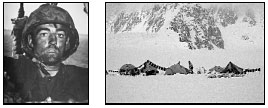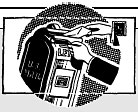Letters
What are the odds that a daughter-in-law of one of the anonymous WWII soldiers pictured in the Spring issue would be a reader of this magazine? Read on before you place your bet . . .
Who goes there?
When I opened the Spring 2000 issue of your magazine and began reading Sybil Smith's article, "Doing Battle," I was quite startled to see on page 34 a photograph taken during World War II of my father-in-law, Gedeon A. LaCroix [see below]. He was a private in the First Battalion, 21st Regiment, 3rd Marine Division at the time the photograph was taken in early November of 1943. He is shown after three days of heavy fighting on Bougainville in the British Solomon Islands and had spent the previous night alone in a Japanese slit trench to escape enemy fire. My father-in-law spent a total of 38 months in the Pacific Theater and was later responsible for capturing the first Japanese soldier on Iwo Jima and escorting him to safety across the island.
A native of Bennington, Vt., he is now retired from the steel business and lives in nearby Arlington, where he and his wife, Jean, are antique dealers. During the winter, he skis five days a week at Stratton Mountain.
Although his name is not attached to this picture in the public record, the photograph first appeared in the New York Times Magazine on April 14, 1944, along with photographs of other anonymous soldiers. The title of that article was "Fighting Faces." The picture was later used to raise money for war bonds.
Katherine Hart
Hanover, N.H.
Hart is the curator of academic programming at Dartmouth's Hood Museum of Art. We obtained the picture of her father-in-law from a CD of WWII photographs that we purchased to illustrate that article.
|
|
A small world
Dr. Thomas Kunstman, my doctor at the University of Colorado at Boulder, completed his residency at Dartmouth and lent me his copy of the Winter 1999 issue of Dartmouth Medicine.
The article in that issue about Dr. Dudley Weider was extremely interesting to me, because I met Dudley on Denali! I was guiding a group of breast-cancer survivors on the mountain at the same time he was there. In fact, a photograph of our camp appears on page 20 in Dartmouth Medicine. The picture [reproduced below] shows the prayer flags that each bear the name of a woman who has had breast cancer; those flags gave us much strength on our climb.
I was also interested in the magazine because I am a prospective medical student, and DMS is my first choice.
All the guides on Denali get together and help in time of hardship; I can attest that Dudley was a great asset while he was there. And in addition to being invaluable as a doctor on Denali, Dudley was also very helpful and inspirational to me (and to my friend Liz Green, who volunteered beside Dudley) regarding our med school pursuits.
Michael Silitch
Boulder, Colo.

|
|
These two photographs from recent issues of the magazine brought to light a couple of intriguing coincidences. See the first two letters above for details. |
Literary misdiagnosis
A friend recently gave me a copy of the Fall 1999 issue of Dartmouth Medicine, which I have fully enjoyed reading. It is both handsome and interesting.
In the article by Catherine Tudish titled "Joseph O'Donnell: Taking the road not taken," I was surprised to learn that Leo Tolstoy had been a physician. I knew that he was interested in educating the peasantry, but not that he had ever practiced medicine, as Anton Chekhov so famously did. Would you be so kind as to give me the source for that information?
Anna Chapman
Arlington, Vt.
Unfortunately, the inclusion of Tolstoy in that article's list of physicianwriters was an error. Tolstoy is often grouped with physician-writers such as Chekhov and William Carlos Williams, since he brought a similar compelling realism to his depictions of illness—most notably in The Death of Ivan Ilych. He was not, however, a physician. We apologize for the "misdiagnosis."
Golden rule
In the essay "Desperately seeking humanity" in the Spring 2000 issue, Dr. Dean Seibert refers to "a megalomaniac leader who invoked Christian mythology to justify genocide against Moslems." Dr. Seibert also says that he found it "difficult to isolate medical ethical dilemmas from the fundamental immorality of the situation."
I believe the teachings of Jesus Christ can help in that type of situation. First, if the leader is intent on evil he is certainly not following Jesus. He is following the one and only enemy of Jesus. It helps to know who the real enemy is, and from what Dr. Seibert witnessed, it is apparent the enemy is the demonic force of hell working through people. Second, Jesus said to love your enemies. What reward is there in simply loving your friends? I can tell by the article that Dr. Seibert loved his enemies, even though it was very difficult.
Anna Mary Page
South Strafford, Vt.
Historical dilemma
I hope you will be able to help me answer a question I have about Dartmouth Medical School. My grandfather, Dr. Charles A. Lamson, graduated from the School in 1891. In 1991, his son Seth, my father, was treated at Dartmouth-Hitchcock Medical Center, and I believe at the time there was a celebration for the centennial of the first graduating class. In other words, I was led to assume that my grandfather had graduated with the first class.
,p>Recently, however, I mentioned this in a program I held for the New London Historical Society and was corrected the next morning by a friend and Dartmouth graduate who was sure the first Medical School class to graduate was in 1847.Would you be able to answer the question of what year the first DMS class graduated?
Thank you for your help with this perplexing matter, and congratulations to the Dartmouth Medicine staff for your excellent publication.
Debra Lamson Perkins
New London, N.H.
Actually, neither of the dates in Perkins's letter is correct. Dartmouth Medical School was founded in 1797 and produced its first graduates (two of them) in 1798. The curriculum in the first few years included two 10-week lecture sessions, plus the expectation of two years' study with a practicing physician —a requirement most students completed prior to entering medical school. The event Perkins's father recalls from 1991 was probably the opening of the new Dartmouth- Hitchcock Medical Center in Lebanon; about a month before the move into the new facility, there was a celebration with many historical elements, to mark the transition out of the old buildings.
Grateful patients
Thank you for offering free subscriptions to the informative and thought-provoking Dartmouth Medicine. When the magazine arrives, it's always the first to be grabbed and read. It really is a sparkling gem of light.
My husband's health-care issues and my treatments for breast cancer have always been accomplished in a most caring and medically competent manner at DHMC. Your magazine has helped us to feel even closer to "our" hospital. We are truly grateful!
Our daughter is a respiratory therapist in Massachusetts and would also appreciate receiving the magazine. Would you be willing to add her as well?
Patricia Chapman
Bridgewater, N.H.
|
|
Denali devotee
It is my understanding that I may receive Dartmouth Medicine at no cost. If that is correct, please add my name to your mailing list.
I am retired from Mary Hitchcock Hospital, and while I am a layperson, I have enjoyed articles from the magazine sent to me on occasion by friends. I also enjoy seeing references to people I knew, even on a limited basis. The issue with the article about Dr. Weider's assault on Denali was outstanding!
Thank you in advance.
Faith G. Bragg
Fort Pierce, Fla.
Additive effect
Could you please send me copies of the Summer and Fall 1999 issues of Dartmouth Medicine and add me to your mailing list to receive future issues? I enjoy your magazine so much!
Helen S. Daniels
Lisbon, N.H.
Prospective premed
Our granddaughter plans to pursue a career in medicine. She has expressed an interest in our copies of Dartmouth Medicine when visiting us and would like to receive the magazine herself. She is enrolled in a Johns Hopkins program for exceptional students and is a junior at Whitman High School in Bethesda, Md. Sincere thanks for making the magazine available to everyone.
J. Clayton and Claire Ramsdell
Lebanon, N.H.
As noted, we're delighted to add to our mailing list anyone interested in the subjects covered in the magazine.
Back to Dartmouth Medicine Summer 2000

 We're always glad to
hear from readers
—whether it's a letter
from a longtime subscriber
who's weighing in
with an opinion, or a
note from someone who would like to
become a longtime subscriber. In fact, we are happy to send Dartmouth
Medicine—on a complimentary basis—to anyone who
is interested in the subjects that are covered in the magazine. We
regret, however, that the complimentary subscription offer can be
extended only to addresses in North America. Both subscription
requests and letters to the editor may be sent to: Editor, Dartmouth
Medicine, One Medical Center Drive (HB 7070),
Lebanon, NH 03756, or via e-mail to:
We're always glad to
hear from readers
—whether it's a letter
from a longtime subscriber
who's weighing in
with an opinion, or a
note from someone who would like to
become a longtime subscriber. In fact, we are happy to send Dartmouth
Medicine—on a complimentary basis—to anyone who
is interested in the subjects that are covered in the magazine. We
regret, however, that the complimentary subscription offer can be
extended only to addresses in North America. Both subscription
requests and letters to the editor may be sent to: Editor, Dartmouth
Medicine, One Medical Center Drive (HB 7070),
Lebanon, NH 03756, or via e-mail to:
 Be sure to tell us when you
move! If your address
changes and you want to
continue to receive the magazine,
just tear off the back
cover of the most recent issue,
write your new address
next to your old one, and mail it to: Dartmouth Medicine, One
Medical Center Drive (HB 7070), Lebanon, NH 03756. It helps
us greatly—since our mailing list is drawn from eight separate
databases—if you send the actual cover (or a photocopy), rather
than just your new address. Note, too, that if you receive more
than one copy of the magazine, it's because of those eight databases.
We're happy to eliminate duplications, but once again it's
a great help if we have the address panel from the cover of all the
copies you receive, not just the one(s) you'd like deleted.
Be sure to tell us when you
move! If your address
changes and you want to
continue to receive the magazine,
just tear off the back
cover of the most recent issue,
write your new address
next to your old one, and mail it to: Dartmouth Medicine, One
Medical Center Drive (HB 7070), Lebanon, NH 03756. It helps
us greatly—since our mailing list is drawn from eight separate
databases—if you send the actual cover (or a photocopy), rather
than just your new address. Note, too, that if you receive more
than one copy of the magazine, it's because of those eight databases.
We're happy to eliminate duplications, but once again it's
a great help if we have the address panel from the cover of all the
copies you receive, not just the one(s) you'd like deleted.